Developing STEM and educational innovations amid war
September 5, 2023
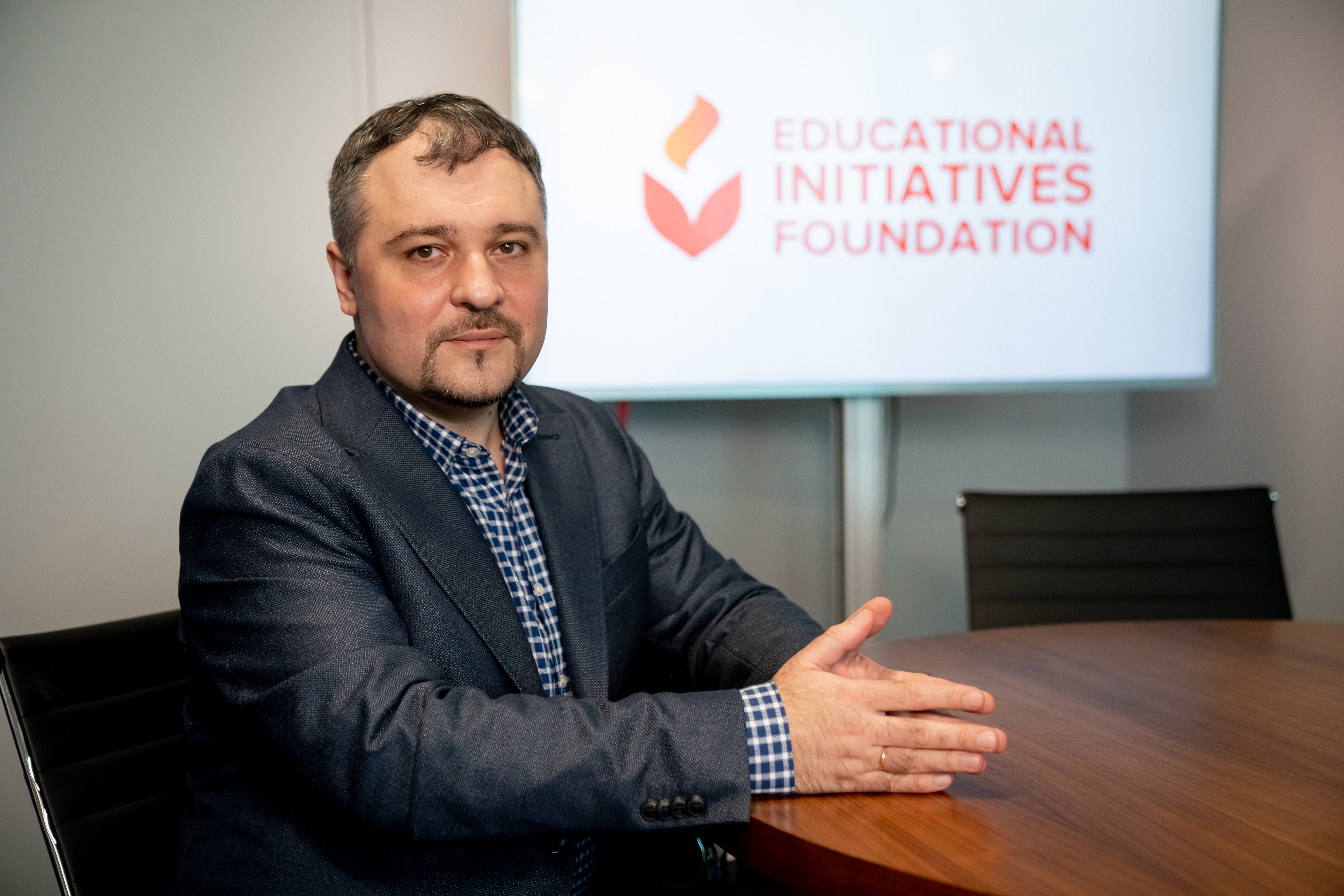
Anton Dziuba, Chairman of the Board of the Educational Initiatives Foundation charity organization.
Obtaining a quality education in Ukraine has been a tough task for years. First, in 2020, the world was hit by the COVID-19 pandemic: Smartphones and laptop screens had to replace the usual desks and textbooks in schools and universities as Ukraine, along with other countries, entered a period of lockdown and working from home.
Two years later, Ukrainian education, which had not yet fully adapted to the dramatic technological changes brought about by the pandemic, faced the onslaught of full-scale Russian invasion and war, which brought with it air raids, missile strikes, and blackouts.
Many students had to flee the country: According to UNICEF data, more than two million of Ukraine’s roughly seven million children have become refugees and fled abroad with their parents, while about three million more children have become internally displaced within the country.
Under such conditions, how can a proper learning environment be maintained, and how can children be encouraged to become interested in math, English, sciences and humanities?
The “Skills of the Future” educational hub, located in Cherkasy, and located at the Cherkasy Regional Institute of Postgraduate Education of Teachers’ STEM Learning and Training Centre, has found answers to these tricky questions.
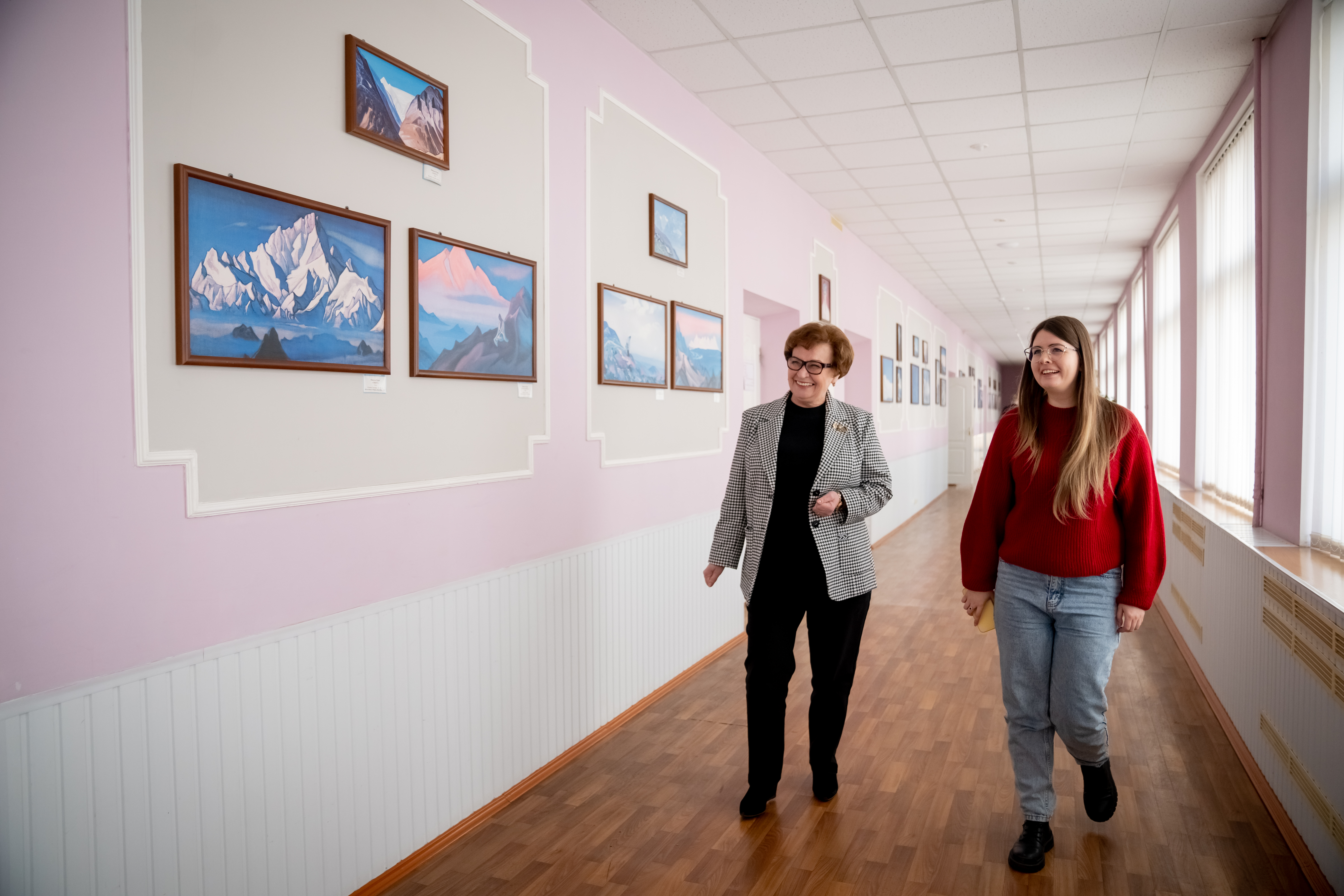
Nataliia Chepurna, rector of the Cherkasy Regional Institute of Postgraduate Education of Teachers (left), in conversation with journalist Marharyta Lubkova.
Three years ago, Nataliia Chepurna, the rector of the Cherkasy Regional Institute of Postgraduate Education of Teachers, met Anton Dziuba, who, together with a group of like-minded educators, has been implementing STEM learning in Ukraine since 2016.
Together, Chepurna and Dziuba decided to set up a STEM Education Centre.
Dziuba says providing children with a STEM education is critical for Ukraine’s future, as this approach integrates the natural sciences and humanities, providing the kind of well-rounded education needed in the modern world.
“If a child has a talent, we need to uncover it,” Dziuba says.
“A child can do anything. They may not be interested in programming, but they can program. STEM means learning via cases.”
With the onset of full-scale Russian invasion of Ukraine, children and parents had to relocate from the worst affected areas to safer places in Ukraine. The Cherkasy Regional Institute of Postgraduate Education of Teachers and its STEM Centre began working with IDP children and supporting teachers in organizing the educational process. The challenges of the war showed them they needed to set up a space where new community residents and their children could be helped to gain a quality education and competencies for the future.
So seven months into Russia’s full-scale invasion of Ukraine, in September 2022, the Educational Initiatives Foundation charity organization, headed by Dziuba, opened its “Skills of the Future” educational hub at the STEM Centre in Cherkasy, supported by the EU4Dialogue project of the European Union and the United Nations Development Programme (UNDP).
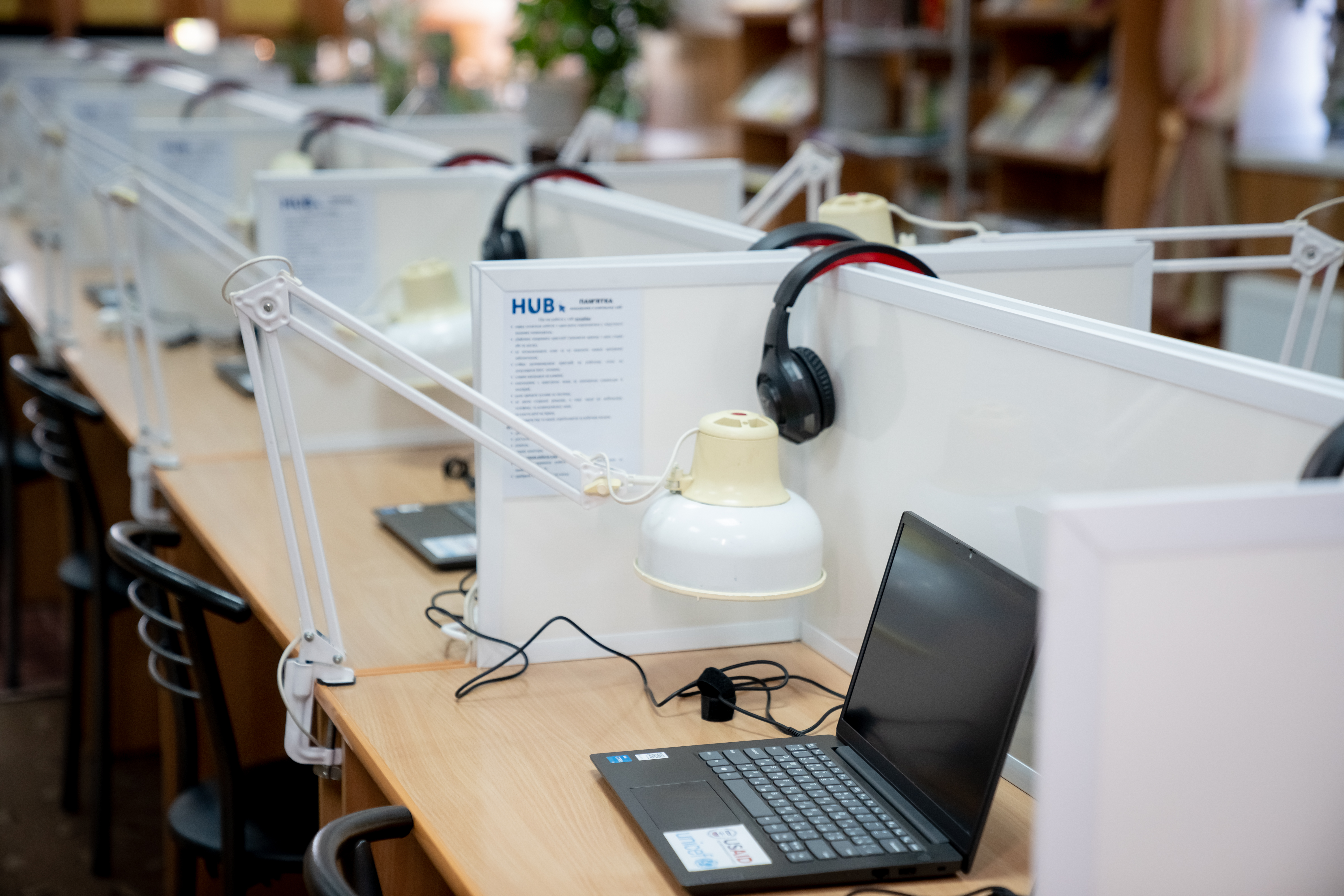
The “Skills of the Future” Educational Hub. Photo: Artem Poznanskyi / UNDP in Ukraine
The new educational hub has laptops that teachers can use to run practical exercises, ranging from creating presentations to programming robots. IDP children got free internet access and opportunities to use modern technology for learning.
The educational hub is now a platform where internally displaced persons – schoolchildren, students, and their parents – can receive educational services and acquire digital competencies. More than 200 people study here every month.
If a family with multiple children has only one laptop or no devices for studying, they can work on computers in the educational hub. Local pupils and students come here together with displaced children.
“We also helped teachers in the frontline areas to complete their annual certification,” says Chepurna.
“By the beginning of the summer of 2022, more than 3,500 teachers from Donetsk, Luhansk, Kherson, and other regions were able to improve their skills remotely.”
If students have internet connection problems during online classes, Chepurna said the centre’s trainers have recorded webinars for them. “They published them on the website so that they would be available at any time,” she says. “And for pupils in grades 1—11, the team recorded video fragments of lessons lasting 10—15 minutes in all school disciplines.”
The STEM Centre also has a 3D printer, Lego sets, various drones, and a unique construction set for building a robot that can perform specific tasks.
STEM trainers Oleh Tkachenko and Yevhen Kachkar conduct their lessons in a computer studio furnished with a multimedia whiteboard, video cameras, and laptops. The trainers, who are now vital team members of the Cherkasy educational hub, bring a unique perspective to the STEM Centre team, derived from the time they spent serving in the State Emergency Service of Ukraine.
Kachkar, who joined the team in 2018, said the State Emergency Service of Ukraine now uses a range of modern technologies, including firefighting robots.
“Robots help in demining,” Kachkar says. “I'm adapting my previous experience and applying it here at the STEM Centre.”
With the support of the EU and the UNDP, the centre's trainers received equipment and comprehensive training, including training on organizing and managing big events.
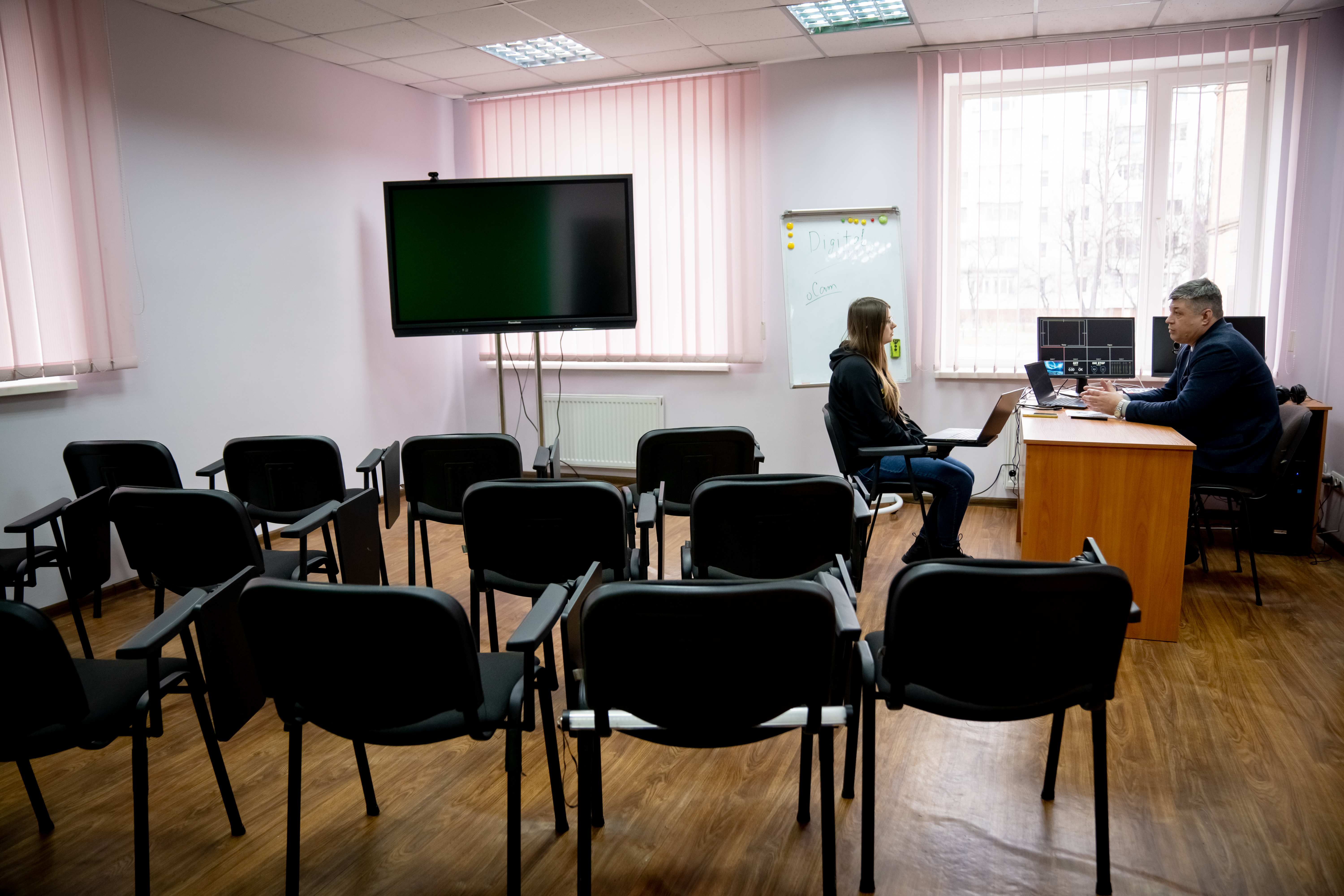
A multimedia classroom for educational activities at the STEM Centre. Photo: Artem Poznanskyi / UNDP in Ukraine
Tkachenko, who joined the team in October 2022, says he used to showcase the work of the SES during firefighting and disaster relief.
“Now I help to develop digitalization at the centre; in particular, we’re exploring new technologies to implement remote education. I train teachers who want to move their lessons online using laptops and smartphones.”
Yulia Zorya, who has worked at the Cherkasy Regional Institute of Postgraduate Education for Teachers for five years, coordinates the work of the STEM Centre's trainers.
Zorya said that although the project primarily caters to IDPs, everyone is welcome at the centre.
“For example, a mother read an ad somewhere on the street and called us, saying, ‘I have an eight-year-old son, but we’re not internally displaced. Can we come?’ I answered that of course they could!”
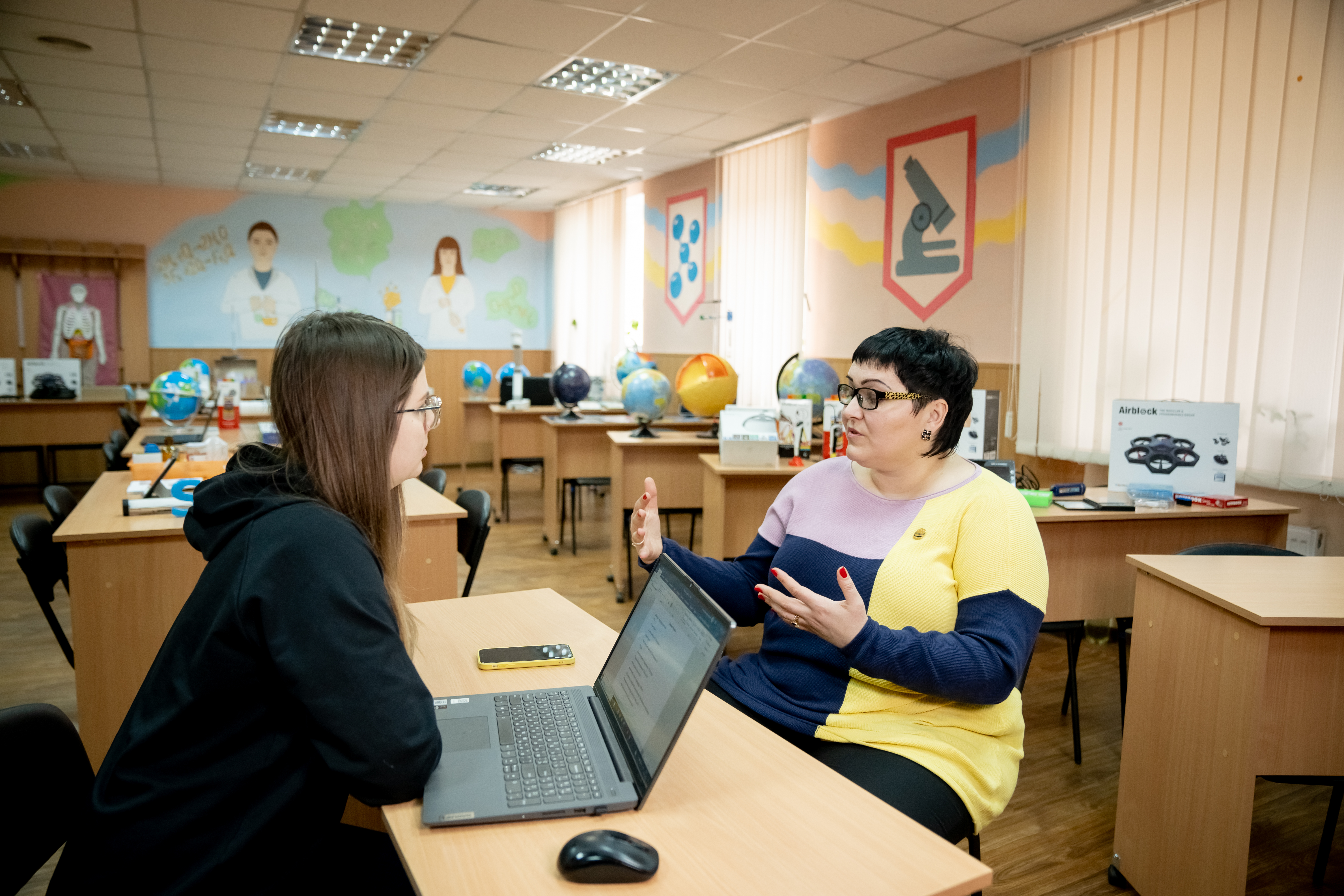
Yulia Zorya, the STEM Centre's coordinator (right), in a conversation with journalist Marharyta Lubkova.
“When launching this project, we realized that in a full-scale war, we must first help those who have suffered,” Zorya says.
“You can get the feeling that someone next to you doesn’t have the basic opportunities that almost everyone used to have. You recognize that people need help, so you give as much as you can.”
Supporting the local host community
While the centre plays a pivotal role in supporting displaced children, it also offers its resources and learning opportunities to the local host community. The educational hub has grown into a vibrant meeting point, where local students and pupils can get together, collaborate, and engage in learning beyond the confines of a traditional classroom setting.
The centre's dedicated team carefully curates groups according to age, interest, and skill level, ensuring that each student receives the most suitable and enriching educational experience. The engaging learning environment at the centre nurtures creativity and innovative thinking: children have the opportunity to assemble robots, work with construction sets, and immerse themselves in cutting-edge technology with virtual reality goggles.
Access to these resources and learning opportunities is entirely free. This inclusivity reaffirms the centre's commitment to fostering an equitable learning environment, where financial constraints do not hinder the quest for knowledge and skills. In this way, the centre not only aids in sustaining the educational journey of displaced students, but also serves as a significant educational asset to the local community.
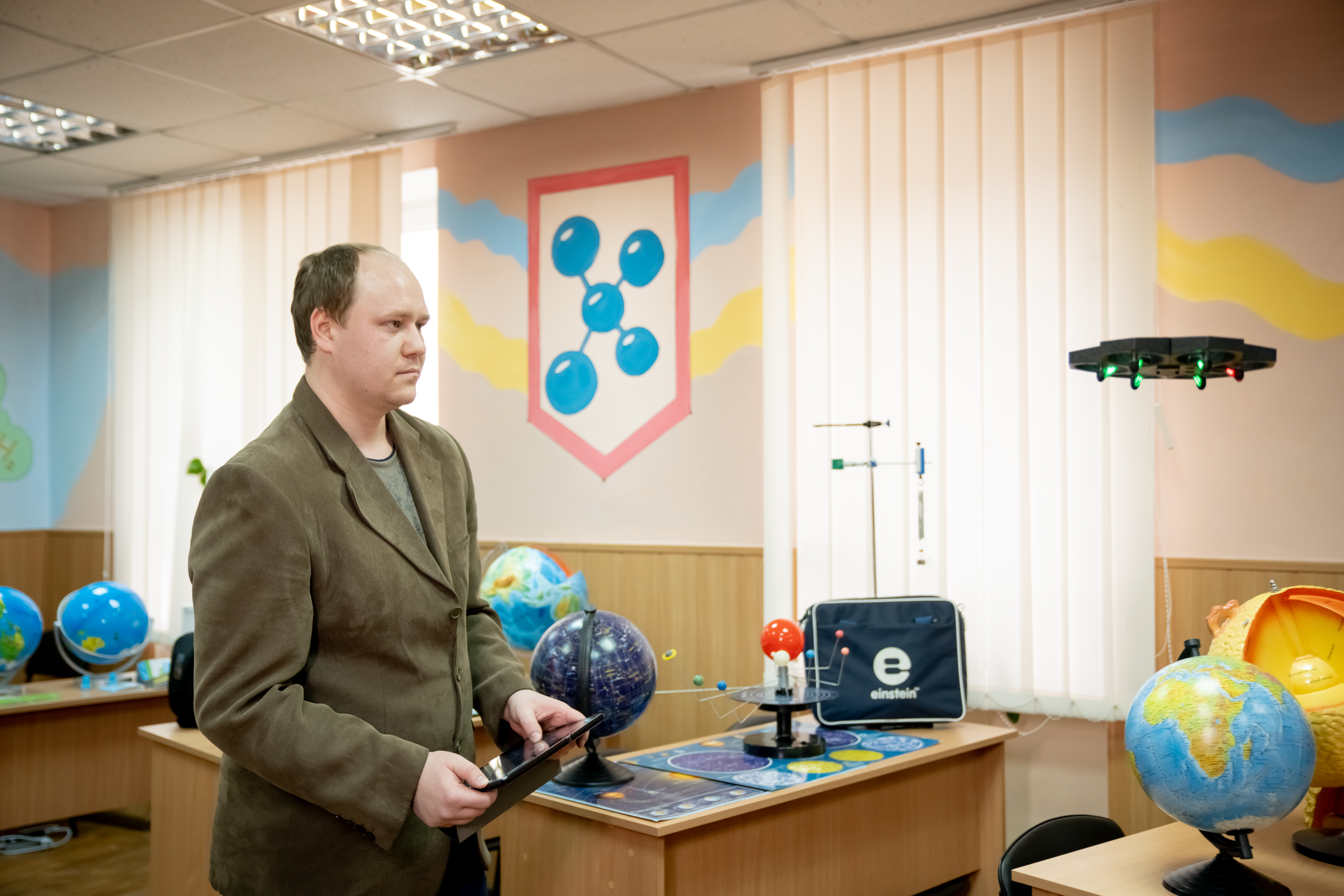
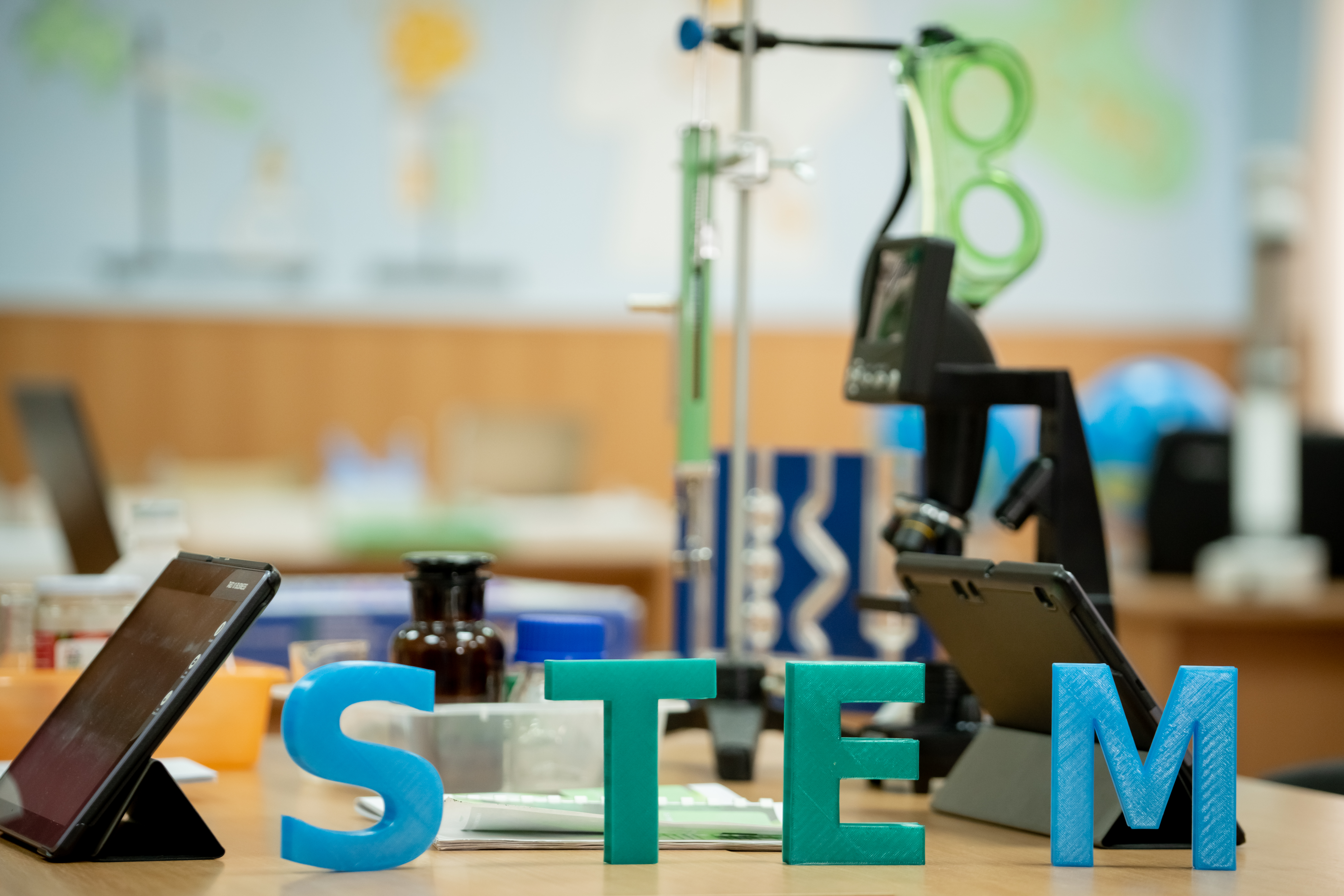
The STEM Learning and Training Centre of the Cherkasy Regional Institute of Postgraduate Education of Teachers.
The teams at the Educational Initiatives Foundation and the STEM Centre at the Cherkasy Regional Institute of Postgraduate Education of Teachers believe that STEM education is something that reveals talents, gives children the opportunity to play in the modern world, and at the same time, learn physics, biology, mathematics, Ukrainian language, and other important subjects.
“It is in our area of expertise to analyse the activities of our colleagues from Cherkasy and give feedback,” said Dziuba. “Via training, we’ve also managed to help the hub’s coaches. Our key task is to ensure the sustainability of the project and the quality of the trainers’ work.”
“We want the hub in Cherkasy to become a powerful digital educational centre.”
The сharitable organization «Educational Initiatives Foundation» is one of the organizations that received support within the program «Response of civil society to the needs of women and men, especially those living in hard-to-reach places and representatives of vulnerable groups» supported by the European Union (EU) and the United Nations Development Programme (UNDP) under the EU-funded EU4Dialogue regional programme to address the most urgent needs of war-affected communities in Ukraine. The EU4Dialogue project aims to build a solid foundation for peace by creating better socioeconomic conditions and a safe environment for war-affected communities.
Author: Marharyta Lubkova
Photos: Artem Poznanskyi / UNDP in Ukraine
Note: This article was produced with the European Union’s and UNDP’s financial assistance under the EU4Dialogue programme. The contents do not necessarily reflect the views or positions of the European Union or UNDP.

 Locations
Locations



